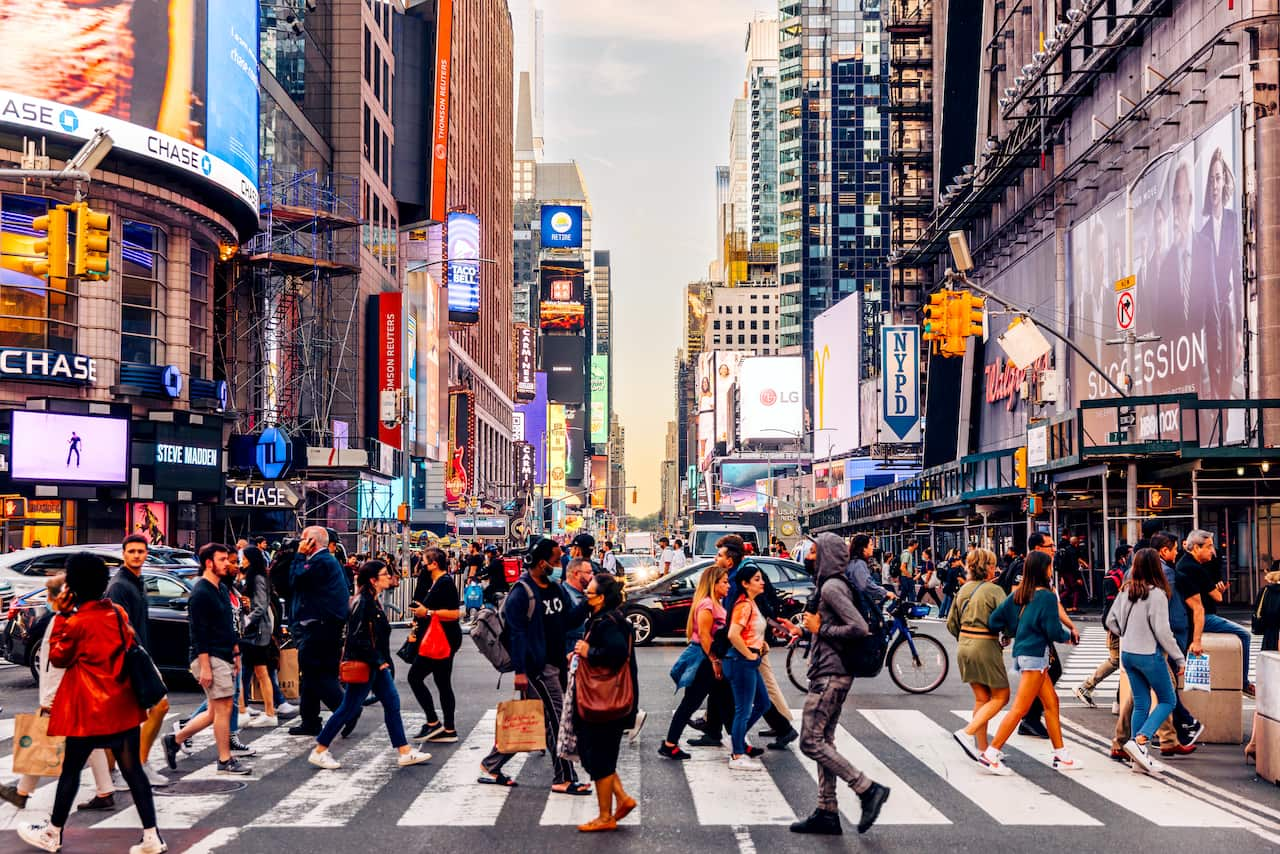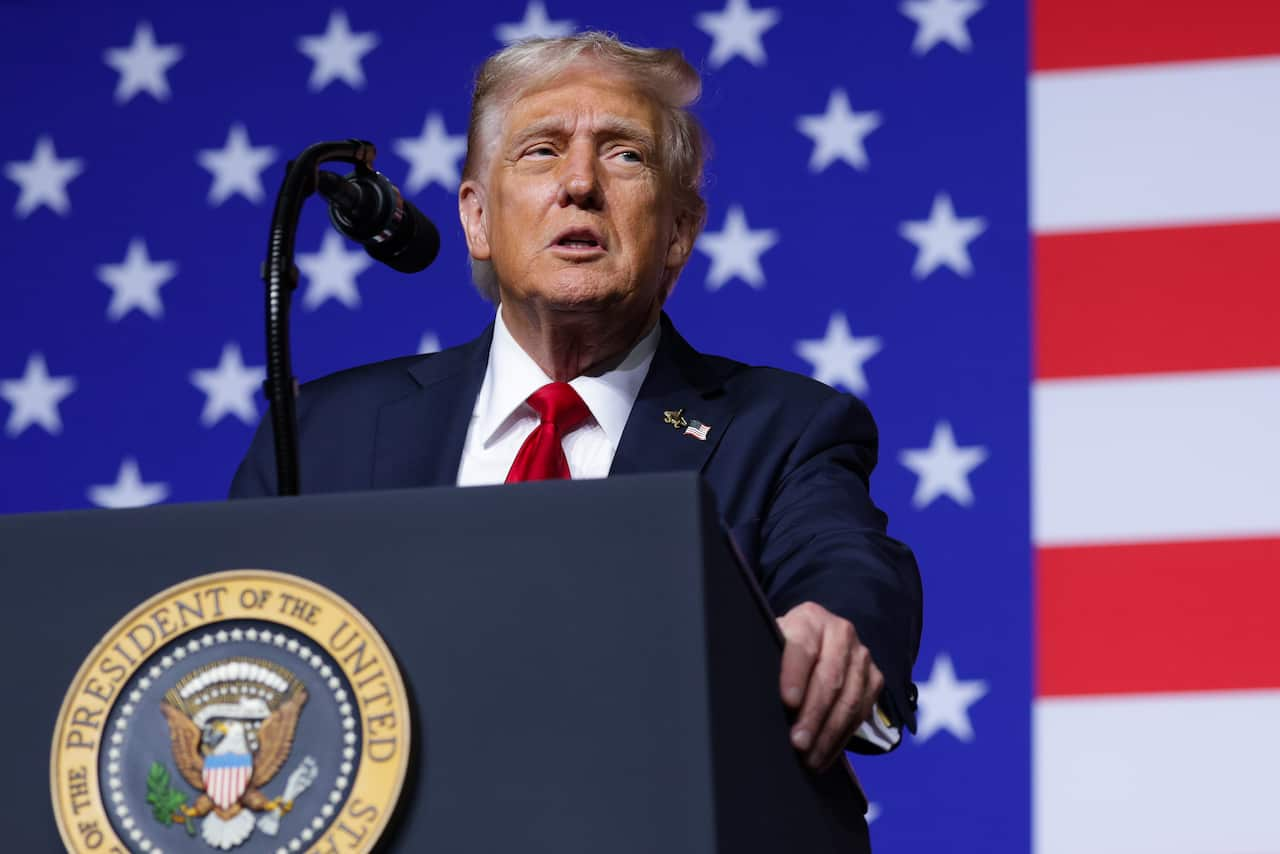Kate (not her real name) describes life as an Australian living in the United States as "dire" right now.
A musical theatre performer and manager of fitness studios, she has been living in the US for nearly seven years and after marrying her husband this year, she acquired a green card, which grants her permanent residency and the right to work.
Kate says New York is "home" to her now. The couple owns an apartment in Brooklyn, they have two dogs and a wide network of close friends from musical theatre and the gym.
But she says the attitude towards foreign nationals under the current administration has made life in the US feel "scary". Kate says these fears were brought to the surface during her green card interview.
"They grilled me in the interview and asked me questions not even related to our marriage but about my previous visa and time in the US," she says.

"I was terrified I wouldn't be approved and every time I travel in and out of the country, there is fear of being deported."
Kate says her husband has taken to waiting nervously outside customs whenever she flies back into the US, as he is "unsure if I'll get through or not".
Some foreign nationals in Kate's social circle have already left the US due to political concerns but she also acknowledges the ability to leave is a privilege.
Most of my friends are local and worry for their futures, their kids' futures.
While she says it might sound "extreme", Kate and her friends have all made contingency plans in case of any sudden changes to the political climate or their safety.

"My friends and I talk about 'to go' bags. We have a safe spot at one of our gyms that we will meet at if cellular service goes down; we have cars ready to go," she says.
"The unexpected could happen at any time and with this government making irrational decisions at the drop of a hat, it wouldn't surprise me if we need to move quick and get out of the country."
'Changes within days'
Many Australians living in the US are reporting experiencing high levels of anxiety and feelings of instability due to the possibility of rapid political change under US President Donald Trump.
Like Kate, others interviewed by SBS News declined to be identified due to concerns that they could be deported for speaking negatively about the US to foreign media.
Around 99,000 Australians live in the US, according to the most recent data from the United States Census Bureau.
Josh Pugh, who runs the America Josh community for expats in the US, tells SBS News that while the first Trump administration held the same beliefs about limiting immigration, a sense of unease has grown in his community during Trump's second term about what the government is capable of doing — and how quickly.
"It feels like they've become more effective at executing what they want to do and that has meant more sweeping changes without checks and balances," he says.
"Changes aren't scheduled months in advance; they're scheduled to enact within days and hours."
Last month, the Trump administration added a US$100,000 ($151,000) fee to the high-skilled worker visa known as the H-1B.
The administration later clarified that it is intended as a one-time fee that will not apply to current visa-holders.
The decision dealt a heavy blow to the tech sector, which relies on skilled workers from China and India but Trump said the change should incentivise American companies to hire US workers.
While most Australians who apply to work in the US typically apply for an E-3 visa, which was introduced as part of a free trade agreement between the two countries in 2005, Pugh says the changes to the H-1B have heightened concerns about the E-3.
"The question I get asked the most is 'Do you think there will be changes to visas, like the E-3?', which is not something I have been asked in my almost nine years," Pugh says.
Like Kate's friends, Pugh says he's seeing more people making contingency plans, asking one another what it would take to leave the US and how they would plan on doing it.
"In most issues, the community is resilient to change and will work through issues as they come, but we're seeing preparedness increasing and more plans being made for what to do if there are more changes to visa statuses or actions that personally impact them," he says.
Visas no longer a guarantee for entry
Sydney-based Stacey Tsui, a partner of immigration at Vialto Partners, which helps skilled workers with international relocation, tells SBS News changes to the E-3 may not be likely but Australians should "expect the unexpected".
"If Australia can keep good diplomatic relations with the US — you know, because we're generally a good ally and it's a small visa program, hopefully it just flies under the radar," Tsui says.
However, recent changes mean Australians on E3 visas may also have to return to Australia every two years to renew their visas, according to a recent directive made by the US state department.
For those on H-1B visas, there has also been continued uncertainty around the freedom to travel outside US borders and return.
While White House spokesperson Karoline Leavitt has said current visa holders can leave and re-enter the country as normal, this has not quelled anxieties about the fee. Earlier this month, Microsoft sent an email to staff saying H-1B visa holders should not leave the country for the foreseeable future.
The likelihood of gaining entry with any visa has also been diminished and Australians have reported being turned away at the border despite holding valid documents.
Advice on the Australian government's Smartraveller website advises that a valid visa does not guarantee entry to the US and "US authorities have broad powers to decide if you're eligible to enter and may determine that you are inadmissible for any reason under US law".
US resident Millie (not her real name) says the current scrutiny around visas is making her feel like a "frog in warm water that is close to boiling".
Originally from Australia, Millie tells SBS News she moved to New York in 2016 with a former partner.
She lives in the US on an O-1B visa, which requires "sustained acclaim in arts" but she's worried about potential rapid changes or expenses that could be applied to that visa that could upend her life.
"If they raised the price of my visa to $100,000 like they did the H1-B, I would not be able to pay that," she says.
"Also, it's ridiculous and even if I could pay it, I wouldn't."
'Saving money in case we need to flee'
Other Australians living in the US report a growing fear of persecution.
Karina (not her real name) has been living in the US for four years and lives with her partner in New York.
She says that while recent changes to visas have caused a significant amount of anxiety – particularly while she was renewing her E3 in April this year – there are broader political changes that have caused her to consider leaving the country.
Karina's wife, whom she married last year, is trans and has had top surgery. Karina says she is "terrified" for her wife's safety in light of rhetoric that threatens LGBTQI+ rights in the US, as well as a number of executive orders signed by the president directing the government not to recognise transgender or nonbinary identities.
The Heritage Foundation, one of the US' most influential conservative policy groups and publisher of a set of ultra-conservative policy proposals known as Project 2025 (and its offshoot the Oversight Project) have pushed for the Federal Bureau of Investigation (FBI) to designate "Transgender Ideology-Inspired Violent Extremism" as a domestic threat category.
The US Supreme Court is also currently weighing up whether to take on a case that could potentially overturn the landmark ruling Obergefell v Hodges that extended marriage rights to same-sex couples.
Karina says she is constantly finding herself "glued to politics" and that these political shifts have made her and her wife reconsider their life in the US, despite significant ties to their large friendship group and family close by in New York state.
"As a queer immigrant, it is hard to feel like the country wants you to stay," she says.
"We have been saving our money in case we need to change our plans and flee quickly."
While she sees a lot of anxiety in her community, Karina says many of her friends are American and the decision to leave is more complicated for them.
"A lot of them are politically motivated and attend protests," she says.
However, I personally do not feel safe to do so.
Those who have already left
Claire (not her real name), 36, says she anticipated the issues that would arise with visas and immigration and decided to leave the night of the US election in November.
She was working for a humanitarian organisation in Washington DC and had been based in the US since 2021 but decided to leave after Trump was re-elected.
"Every month since has confirmed it was the right decision," she says.
"My E3 [visa] was set to expire in September 2025 and so I would have had to renew or reapply. I was worried that because of my work and advocacy on humanitarian issues, it would get denied and I wouldn't be able to re-enter the US."
Claire says she had an established life in the US, including an American partner, a cat, and a large community of friends but she felt she was given no choice but to leave.
"I didn't want access to my life to be down to the whims of a border officer every time I had to travel for work — which includes to places like Iraq and Sudan, which would not be looked at kindly," she says.
Now living in Geneva, Claire says she is in a challenging situation with her partner, who has remained in the US and works in medicine. To join her and practice in Switzerland, he would need to attain EU qualifications.
While she says she enjoys parts of the US, the "lack of clarity" about her future there as a foreign worker has made her resolute that she does not want to return in the immediate future.
The deployment of the National Guard to Washington DC in August made Claire even more confident in her decision to leave.
"The rise of hateful rhetoric, and actions from political leaders, and the suspension of basic legal norms doesn't make it a place I wanted to spend more time and energy investing in."
For the latest from SBS News, download our app and subscribe to our newsletter.

